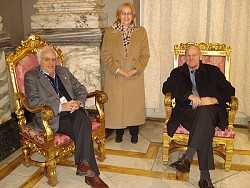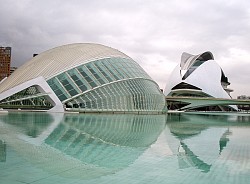FIG Commission 3 Workshop on “Spatial Information Management
Toward Environmental Management of Mega Cities”
Valencia, Spain, 18-21 February 2008
|

Prof.
Pedro Cavero and Dr. Chryssy Potsiou together
with President Stig Enemark at reception at the Valencia City
Hall. |

Santiago Calatrava's architecture in new Valencia.
|
The 2008 Workshop and Annual Meeting of FIG Commission 3 on “Spatial
Information Management Toward Environmental Management of Mega Cities”
took place in Valencia, Spain, from 18th to 21st February 2008. This
Workshop was supported by ISPRS, EARSeL, INSPIRE, EuroSDR, UN/ECE Committee
on Housing and Land Management and the Working Party on Land Administration,
and FIG Commission 2.
The year 2007 was a turning point in human history as 50% of the world’s
population became urbanized. Rapid urbanization is a phenomenon of our
times. The speed and scale of current urban population growth generate
important challenges for surveyors, planners and governments.
This FIG Commission 3 Workshop focused on how surveyors can, through SDIs
and good land administration, provide reliable spatial data and the means
for monitoring, planning and providing good management of the rapidly
increasing urban areas.
Organization
Local Organizers were the Spanish Association of Surveyors - the Colegio
Oficial de Ingenieros Tecnicos en Topografia, the Technical University of
Valencia - Universitat Politecnica de Valencia, and the Royal Academy of
Culture - Royal Academia de Cultura Valenciana. It was also supported by the
General Direction of Cadastre of the Spanish Ministry of Finance. The FIG
Commission 3 Workshop was integrated into the Spanish IX National
Congress of Surveying Engineers TOP-CART 2008. In parallel, a modern
technical exhibition was organized at the conference venue.
This was an ambitious and impressive event, which consisted of five joint
sessions (opening session, 3 plenary sessions and closing session) and 26
parallel sessions with 124 papers in total, while all participants (Spanish
and international) were distributed through all parallel sessions. In total,
more than 450 Spanish and 85 international delegates participated in this
event. The first plenary session was held on “Cadastre, electronic
administration and land management to support sustainable development”
and the keynote speakers were Mr Jesus Miranda, General Director of
the Spanish Cadastre, Prof Stig Enemark, President of FIG and Prof Ian Williamson. The second session was on the technical aspects of
“Cartography, Photogrammetry and Remote Sensing for the benefit of
society”; the keynote speakers were Mr Alberto Sereno, General
Director of the National Cartographic Institute of Spain, Prof Agustin
Pichel, and Prof Ian Dowman, President of ISPRS. The third
session was on “Urban Panning aspects and the impacts of rapid
urbanization”; the keynote speakers were Mr Juan Antonio Altes Marti,
Head of the Urban Planning Department in the Valencia City Hall and Dr Chryssy A Potsiou, chair of FIG Commission 3.
According to the words of Prof Pedro Cavero, head of the
Organizing Committee, the objectives of this congress were “...to
emphasize before the Authorities and the Society the role of our profession
at national and international level, to give to our colleagues the
opportunity of rejoining, knowing new technologies and professional
realities inside and outside Spain, to show our present engineering profile
and the incoming future, to enhance the need of making the property unit, in
its widest meaning, the main future of our profession as a core unit of
national and regional SDIs, to show the future of surveying education and
Spanish Universities in terms of the Bologna declaration, to promote the
important role of our international associations FIG and ISPRS and the
collaboration with sister associations like UN and World Bank for the
welfare and development of the developing countries and the countries in
transition, and through the FIG Commission 3 Workshop to know an essential
field, not only for our profession but for the society, environment and
quality of life as well, to show the enormous humanitarian component of our
profession and to increase if possible our love and dedication to surveying
and to everything surveying represents to us and to the society which we
serve.”
More than 78 international delegates registered for the Commission 3
Workshop, coming from 28 countries: Albania 2, Australia 1, Azerbaijan 2,
Bulgaria 2, Belgium 5, Canada 1, China 2, Denmark 1, Finland 1, Germany 7,
Greece 13, Hungary 3, Israel 3, Italy 1, Kenya 1, Latvia 1, Lithuania 1,
Lebanon 1, Netherlands 1, Norway 2, Poland 2, Romania 2, Russia 3, Spain 7,
Sweden 3, Turkey 4, UK 5, USA 1.
Commission 3 delegates were welcomed by Prof Pedro Cavero, head of the
organizing committee, Jeronimo Miron, UN/ECE WPLA Spanish delegate,
FIG President Prof Stig Enemark, and Dr Chryssy A Potsiou, chair of FIG
Commission 3. Invited Commission 3 keynote speakers were Prof Stig Enemark,
President of FIG, who spoke on the subject “Promoting Problem Solving
Skills”, Prof Ian Dowman, President of ISPRS, who spoke on “3D City
Models”, Michael Gould who addressed “the INSPIRE initiative
and its Implications”, Kevin Mooney who addressed the “EuroSDR’s
research activities in urban spatial data collection, management and
delivery”, Dr Ana Maria Cruz who presented the “Results of the
2008 Natech Workshop: Assessing and Managing Natech Risks”, and
distinguished delegates representing European Cadastral and Mapping Agencies
whose presentations included the latest achievements in the field of
multipurpose cadastre and SDI research and best practice in city
environmental management. Once again, Commission 3 has attracted a large
number of distinguished FIG academics and researchers who have coordinated
their academic research on the Commission 3 selected topics. The optional
double blind peer review of submitted papers was applied for a second year
in a Commission 3 Workshop. Nine papers received successful peer review for
this Workshop.
Besides the five joint sessions, this Commission 3 Workshop had eight
more technical sessions with 44 presentations in all, focused on the
Workshop’s topic. Technical sessions addressed “SIM and Urban Development”,
“City Management Case Studies”, “SDIs for Management of Mega
Cities and Increasing Urban Areas”, “SIM and Spatial Planning”, “SIM
in Risk Management and Cultural Heritage Aspects Related to Urban Areas”,
“Environmental Monitoring”, “Technical Aspects for Urban
Management”, and “Educational Issues Related to Problem-based
Learning”. The Workshop’s resolutions will be available soon. All papers
and resolutions will be published in the Workshop’s proceedings and on the
FIG website. An additional specific publication of peer-reviewed papers will
be published soon.
The Workshop’s activities were augmented by a series of social events
including the opening cocktail party provided by the exhibitors, lunches at
the university restaurant, the Commission 3 dinner partially sponsored by
Commission 3, an impressive reception provided by the local authorities at
the Valencia City Hall, a visit to the art gallery where an exhibition of
old maps was on view, a sight-seeing event for the accompanying persons
program, and a glamorous gala dinner at Astoria hotel offered by the
organizers. Nice gifts were offered to all delegates by the local organizers
at the gala dinner.
Follow-ups
This was the second FIG Commission 3 annual Workshop and meeting of the
2007-2010 period. The next Workshop (follow-up) will be held in Germany, in
February 2009 with the topic “Spatial Information for Sustainable
Management of Urban Areas”. More detailed information regarding local
organizers and the specific topics will be published soon.
Chryssy A Potsiou
Chair FIG Commission 3 - Spatial Information Management
|

